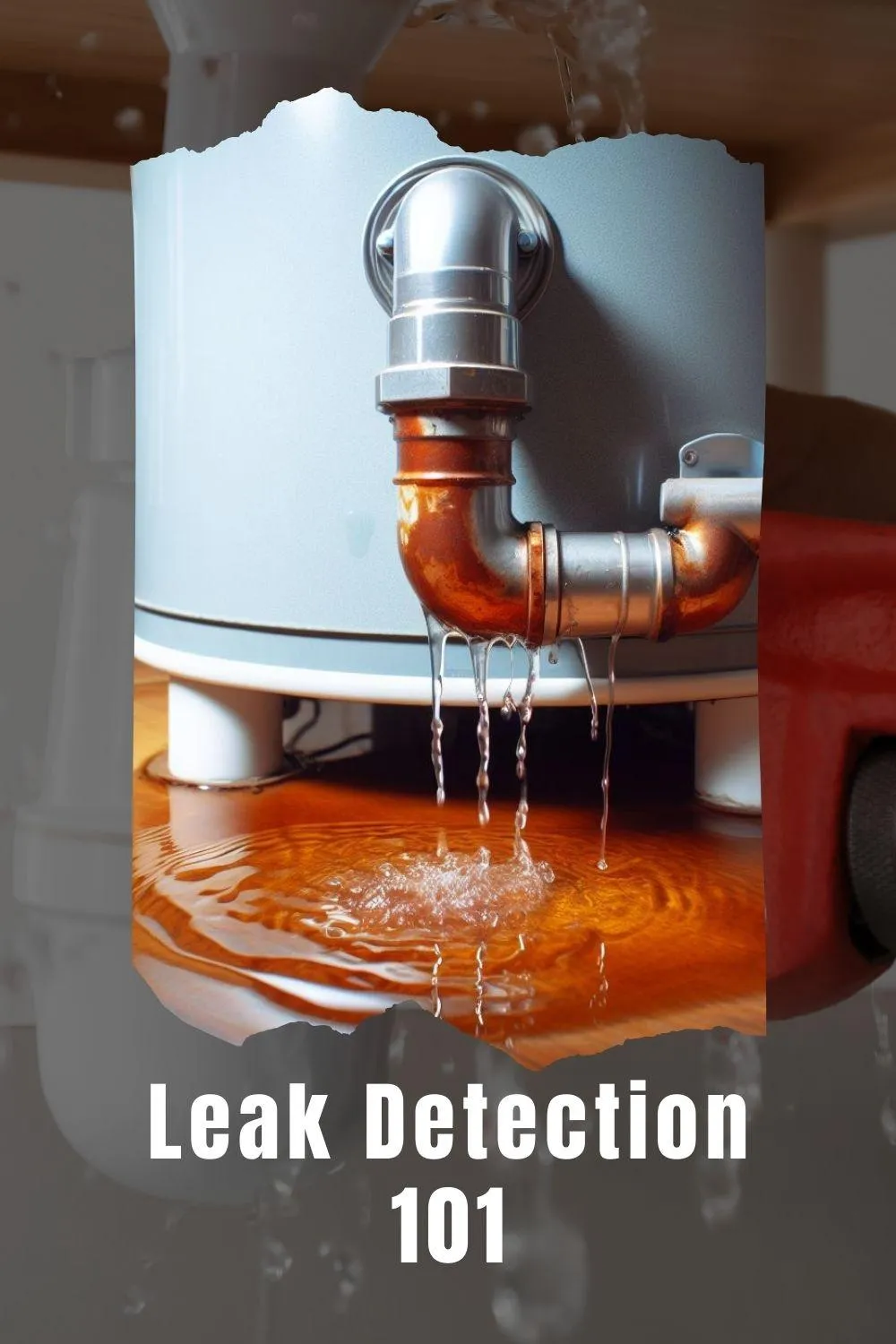
Drip, Drip, Drip: Spotting Tank Leaks
“Understanding the subtle signs of tank leaks isn't just about fixing drips, it's about protecting your home and wallet from unexpected water damage.” - Appliance Boss
Introduction:
Welcome to our comprehensive guide on detecting tank leaks brought to you by Zip Appliance and Plumbing Repair in Bakersfield, California. In this article, we'll explore the importance of identifying leaks early to prevent costly damage and ensure the efficient operation of your hot water system.
Importance of identifying leaks early:
Detecting leaks early is crucial for maintaining the integrity of your hot water system and avoiding costly repairs. By spotting leaks in their initial stages, you can prevent water damage to your home and extend the lifespan of your hot water tank.

Understanding Hot Water Tanks:
Overview of hot water tank systems:
Hot water tanks, also known as water heaters, are essential components of residential plumbing systems. They store and heat water for various household uses, such as bathing, cooking, and cleaning. Hot water tanks come in different types, including traditional storage tanks and tankless models, each with its own advantages and disadvantages.
Common causes of leaks in hot water tanks:
Several factors can contribute to leaks in hot water tanks, including corrosion, high water pressure, temperature fluctuations, and wear and tear. Corrosion, caused by chemical reactions between water and metal components, weakens the tank's structure and leads to leaks over time. High water pressure can strain the tank's fittings and connections, causing them to fail and leak. Temperature fluctuations can cause the tank's materials to expand and contract, creating stress points that may eventually develop into leaks. Wear and tear from age and usage can also contribute to leaks, as seals and gaskets degrade over time.
The Importance of Timely Detection:
Consequences of ignoring leaks:
Ignoring leaks in your hot water tank can have serious consequences, both financially and environmentally. Water damage from leaks can lead to costly repairs, structural damage to your home, and mold growth. Additionally, wasted water from leaks contributes to water scarcity and puts unnecessary strain on local water resources.
Costly repairs and potential water damage:
Repairing water damage caused by leaks can be expensive and time-consuming. In addition to repairing the leak itself, you may need to replace damaged flooring, drywall, and other structural components of your home. Mold remediation may also be necessary to ensure the health and safety of your family. By detecting leaks early and addressing them promptly, you can avoid these costly repairs and minimize the risk of water damage to your home.
Signs Your Hot Water Tank Might Be Leaking:
Visual indicators:
Puddles around the tank:
One of the most obvious signs of a leaking hot water tank is the presence of puddles or water stains around the base of the tank. These puddles may indicate a leak in the tank itself or in the surrounding plumbing connections.
Rust or corrosion on the tank surface:
Another visual indicator of a leaking hot water tank is rust or corrosion on the tank's surface. Corrosion weakens the tank's structure and creates vulnerabilities that can lead to leaks over time.
Auditory cues:
Dripping or hissing sounds:
Auditory cues, such as dripping or hissing sounds coming from your hot water tank, may indicate a leak. These sounds occur when water is escaping from the tank or when pressure is building up in the plumbing system due to a leak.
Performance issues:
Inconsistent water temperature:
If you notice that your hot water temperature fluctuates unexpectedly or remains consistently lukewarm, it may be a sign of a leaking hot water tank. Leaks can disrupt the heating process, causing the water temperature to fluctuate or drop below the desired level.
Reduced water pressure:
Another performance issue that may indicate a leaking hot water tank is reduced water pressure. Leaks in the tank or associated plumbing connections can cause water pressure to drop, resulting in weak or inconsistent water flow from your faucets and showerheads.
DIY Leak Detection Techniques:
Step-by-step inspection guide:
To detect leaks in your hot water tank, start by conducting a visual inspection of the tank and surrounding area. Look for puddles, water stains, rust, or corrosion on the tank's surface, as well as any unusual sounds or performance issues.
Checking for visible leaks:
If you suspect a leak in your hot water tank, carefully examine the tank and surrounding plumbing connections for any signs of water accumulation or damage. Use a flashlight to inspect hard-to-reach areas, such as behind the tank and under the sink.
Listening for unusual sounds:
Listen carefully for any unusual sounds coming from your hot water tank, such as dripping or hissing noises. These sounds may indicate a leak in the tank or associated plumbing connections.
Testing water temperature and pressure:
Test the water temperature and pressure in your home to ensure they are consistent with normal operation. If you notice any fluctuations or inconsistencies, it may be a sign of a leaking hot water tank.
Using dye tablets to detect hidden leaks:
If you suspect a hidden leak in your hot water tank, you can use dye tablets to detect it. Simply add the dye tablets to the water in the tank and wait for them to dissolve. If the dye appears outside the tank or in the toilet bowl, it may indicate a leak in the tank or associated plumbing.
When to Call a Professional:
Knowing when DIY isn't enough:
While DIY techniques can help detect some leaks in your hot water tank, there are times when it's best to call in a professional plumber. If you're unable to locate or repair the leak yourself, or if you suspect a more significant issue with your hot water tank, it's essential to seek professional assistance.
Importance of timely repairs to prevent further damage:
It's important to address leaks in your hot water tank promptly to prevent further damage to your home and plumbing system. Even small leaks can lead to costly repairs and extensive water damage if left unchecked. By calling a professional plumber to assess the situation and make any necessary repairs, you can prevent further damage and ensure the continued operation of your hot water tank.
Preventive Maintenance Tips:
Regular tank inspections:
Schedule regular inspections of your hot water tank to check for signs of leaks or other issues. Look for puddles, water stains, rust, or corrosion on the tank's surface, as well as any unusual sounds or performance issues.
Flushing the tank to remove sediment buildup:
Flushing your hot water tank regularly can help prevent sediment buildup, which can contribute to leaks and decreased efficiency. Follow the manufacturer's instructions for flushing your tank, or consult a professional plumber for assistance.
Replacing worn-out parts before leaks occur:
Replace worn-out parts, such as valves, seals, and fittings, before they fail and cause leaks. Regularly inspect these components for signs of wear and tear, and replace them as needed to prevent leaks and ensure the continued operation of your hot water tank.
Dealing with Common Leak Scenarios:
Pinhole leaks:
Pinhole leaks, caused by corrosion or stress on the tank's surface, can often be repaired with epoxy or soldering techniques. However, if the leak is extensive or located in a challenging-to-reach area, it may be necessary to replace the tank altogether.
Valve leaks:
Valve leaks, which occur when seals or gaskets fail, can usually be repaired by replacing the faulty components. Identifying the source of the leak and selecting the appropriate replacement parts is essential to ensuring a successful repair.
Tank corrosion:
Tank corrosion is a more serious issue that may require professional intervention. In some cases, a corroded tank may need to be replaced to prevent catastrophic failure and water damage.
Emergency Response Plan:
What to do if you discover a leak:
If you discover a leak in your hot water tank, it's essential to act quickly to minimize damage to your home. Start by shutting off the water supply to the tank to prevent further leakage. Next, contain the leak by placing a bucket or towels under the affected area to catch any dripping water. Finally, contact a plumber as soon as possible to assess the situation and make any necessary repairs.
Containing the leak:
In addition to shutting off the water supply and containing the leak, you may need to take additional steps to prevent further damage to your home. If the leak is extensive, consider placing a tarp or plastic sheeting over the affected area to divert water away from your belongings and furnishings.
Calling a plumber:
Once you've contained the leak and taken steps to prevent further damage, contact a professional plumber to assess the situation and make any necessary repairs. A qualified plumber can accurately diagnose the problem and recommend the appropriate repairs or replacements to prevent further damage.
The Cost of Ignoring Leaks:
Financial implications of water damage:
Ignoring leaks in your hot water tank can have significant financial implications, both in terms of repair costs and increased water bills. Water damage repairs can be expensive, especially if they involve structural damage or mold remediation. Additionally, wasted water from leaks can drive up your water bill, leading to increased monthly expenses.
Environmental impact of wasted water:
In addition to the financial implications, ignoring leaks in your hot water tank can also have environmental consequences. Wasted water from leaks contributes to water scarcity and puts unnecessary strain on local water resources. By fixing leaks promptly and conserving water, you can reduce your environmental footprint and contribute to water conservation efforts.
FAQs About Tank Leaks:
Can leaks fix themselves over time?
While small leaks may appear to stop on their own, they often worsen over time and can cause significant damage if left unaddressed. It's important to address leaks promptly to prevent further damage to your home and plumbing system.
How often should I inspect my hot water tank?
It's recommended to inspect your hot water tank at least once a year to check for signs of leaks or other issues. Regular inspections can help detect leaks early and prevent costly repairs down the line.
Can I prevent leaks with regular maintenance?
Yes, regular maintenance, including flushing the tank and replacing worn-out parts, can help prevent leaks and prolong the life of your hot water tank. By staying proactive and addressing any issues promptly, you can avoid costly repairs and ensure the continued operation of your hot water system.
Conclusion:
In conclusion, detecting and addressing leaks in your hot water tank is crucial for maintaining a safe and efficient plumbing system. By staying vigilant for signs of leaks, performing regular maintenance, and knowing when to seek professional help, you can prevent costly damage to your home and ensure the longevity of your hot water tank. Remember, early detection is key to avoiding expensive repairs and protecting your home from water damage.
For professional plumbing services and expert leak detection, contact Zip Appliance and Plumbing Repair today at (661) 387-2282 or visit our website at www.ziprepairservice.com. Let us help you keep your hot water system running smoothly and your home free from leaks.
